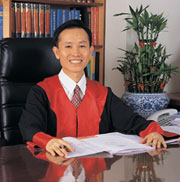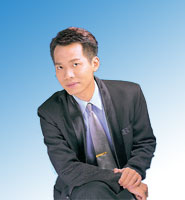|
The purpose of the Chung Ching
United Office is to implement the New Notary Law passed on April
23th of 2001 and its corresponding new policies regarding a Public
Notary, which is promoted by Judicial Yuan, and our office specializes
in providing convenient notarization and certification services
for various institutes, groups, firms, and the Public. On December
13th of 2001, our office applied for registration and received approval
from the Taipei District Court of Taiwan to legally handle all business
regarding notarization and certification. Our office is located
in the First District of the city of Taipei at 7-1Floor, Number
121, Chung Ching South Road, Section 1, Chung Cheng District of
Taipei, whereas, Judicial Yuan is located at the intersection of
Chung Ching South Road and Heng Yang Road |
| |
| Biography of the Director: |
 T
The director of our office, Hsieh
Yung Chih, is the first legal service attorney who has been duly
honored as a「Professional Public Notary」in the Taiwan area during
the first term of Judicial Yuan. He is a devout Christian who believes
his career to be in innovating the notary system and promoting research,
which is why he has decided to quit his career as a legal service
attorney. Starting in July of 2001, he received pre-professional
training to become a Public Notary at the Learning Center of Law
Enforcement Personnel of Judicial Yuan and the Notary Office of
Taipei District Court. He officially became a「Professional Public
Notary」in December of 2001 and he hopes that he can be a equitable,
objective and moral 「Civil Law Planner」who can educe fairness and
justice in the future.」。 |
| |
| Speech from the Vice-Director: |
 P Previously,
to authorize notarization was limited to only the judicial government.
Complying with the universal notarization system, Judicial Yuan
has introduced and used the 「Latin Notarization System」, which was
officially passed on April 23rd of 2001. Our office specializes
in executing the new law, and I am deeply honored that I can contribute
to the execution of the new notarization system. I hope to establish
more approachable notarization and certification services that the
Public can trust without question. |
| |
| Systems of Notarization: |
| 1. Systems |
| There
are three major notarization systems in the world. The first one
is called civil service identity and is used in countries such as
Denmark in Scandinavia and Taiwan before Taiwan switched to its
new system. This system called for subordinating to the court or
officials in the Judicial and Administrative branches of government,
which in Taiwan's case, would be to comply with officials in Mainland
China. The second system is self-employment, the system used in
the United States. The third system is in-between the first and
second systems: a Public Notary must have official certification.
A Public Notary may be known as a Latin Notary in Germany, Austria,
France, Belgium, Japan, etc., and this third system is the new system
that has been introduced by the Taiwan Notary Law giving Taiwan
its first『Public Notary』.
|
| |
| 2. Qualifications: |
| According
to Article 25 of the new Notary Law, a Public Notary must be a citizen
of the ROC with one of the following qualifications: |
| (1) |
Passed the examination of a Public Notary. |
| (2) |
Served as a judge or prosecutor before: Qualified through
investiture. |
| (3) |
Served as a public defender before: Qualifier through investiture. |
| (4) |
Served as a notary in court before and qualified through investiture
or |
| |
served as a notary public before. |
| (5) |
Passed the Attorney Examination through the National Highest
|
| |
Examination and has provided legal service for more than three
years. |
|
| |
| 3. Function: |
|
The Latin notarization system
originates in Rome where a public notary exists in the public and
not in the judicial system. One must undergo professional law training
to qualify to become a notary. In regards to handling notarization
and certification, based on related legal and private rights, the
service is not only a formal investigation, but also a practical
service, which provides law consultation. The consultation can eliminate
any possible factor, which might lead to a dispute by making full
use of one's protection of private rights, and it may lower the
chances of prosecution. A Public Notary not only finishes the procedure
required of notarization and certification for a client in accordance
with the law, but he is also a specialized law consultant, objective
compromiser, protector of those less fortunate and an oral transcriber. |
| |
| Introducing Our Public Notaries: |
| Our office currently has two Public Notaries
on staff: Hsieh Yung-Chih, and Chen Lee-Tsung. The following is a
summary of their educational background and work experience: |
| 1. Hsieh Yung-Chih, Public Notary: |
| |
Head director of our office,
he is responsible for overseeing all affairs. He has received
a law degree from Soochow University, obtained a Land Scrivener
license by examination in 1991 and obtained an attorney license
by examination in 1993. He currently works towards his master
degree in Continental Law in the Mainland China Department
at Soochow University. Mr. Hsieh is a broker who specializes
in handling cases regarding real estate rent, loans, joint
construction, contracts, building engineering, architecture,
formal wills, legal affairs relating to the laws of Taiwan
and China, etc. He is also a volunteer in the Law Service
Association of Soochow University and “Thuei Mom Foundation,”
and he has notable experience in compromising cases, law planning,
consultation and formalizing various law documents. |
|
| |
| 2. Chen Lee-Tsung, Public Notary: |
| |
Mr. Chen received a law degree
from Soochow University and passed the National Highest Examination.
He is in his first term as a Public Notary, and he currently
is working on a master in Technical Law at Soochow University.
Mr. Chen specializes in handling delegated contracts, wills,
loans, consuming loans, real estate rent, foreign documents,
as well as notarizing and certifying documents between Taiwan
and China. |
|